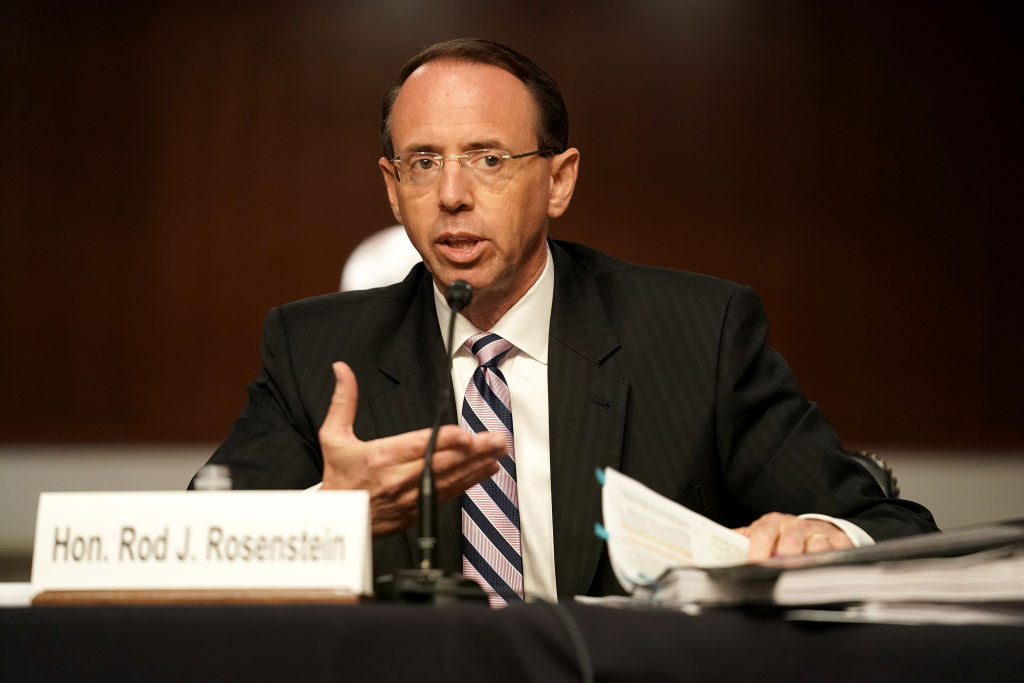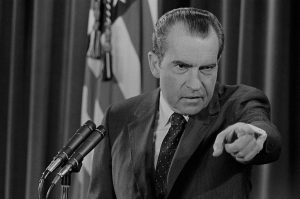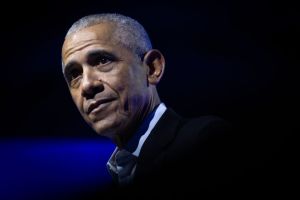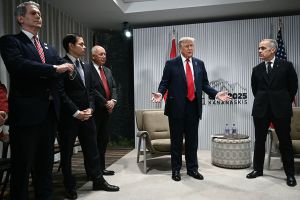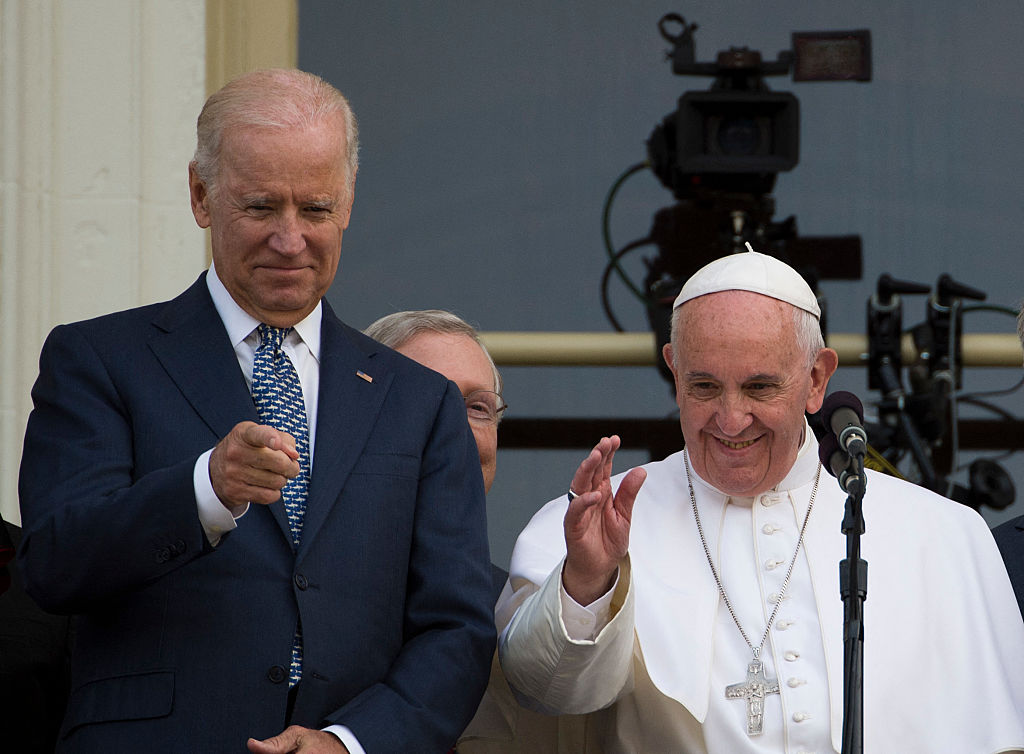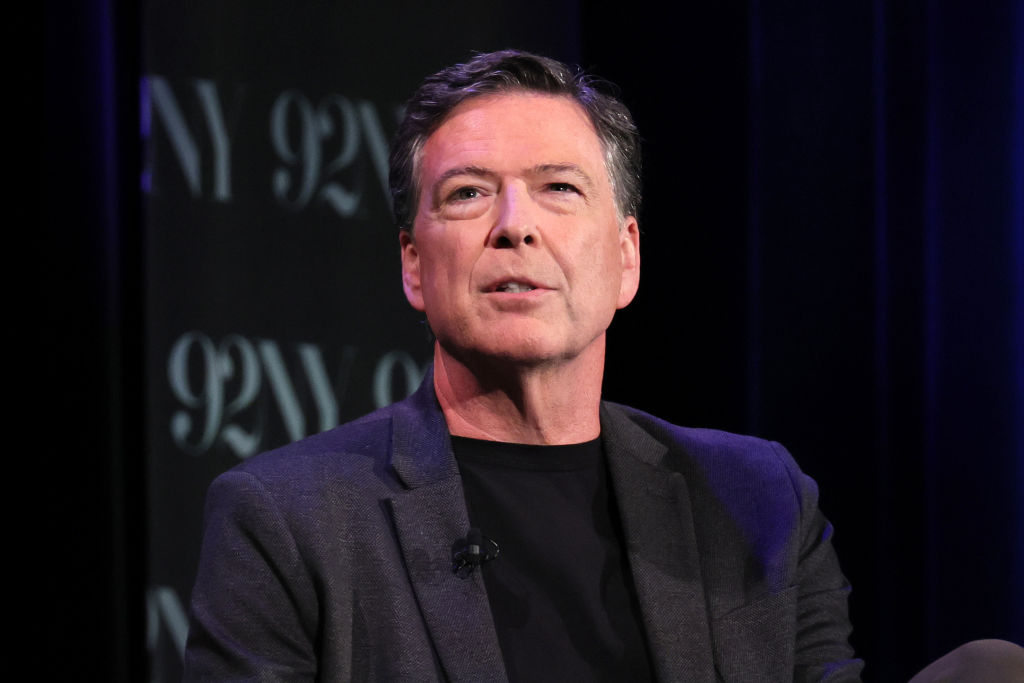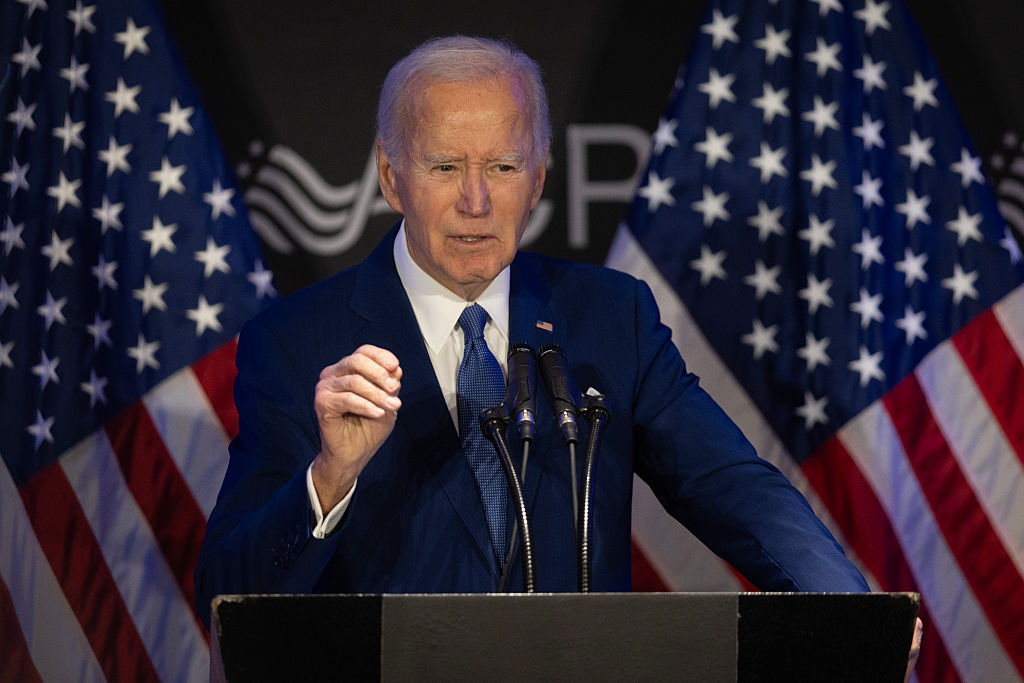Rod Rosenstein’s testimony before the Senate Judiciary Committee was quiet, calm, almost bemused. But the tale he told was devastating — to the FBI, the Department of Justice, and the Mueller investigation. It destroyed three years of media narrative about ‘Trump-Russia’ collusion. It’s obvious now why Senate Democrats want to kill all future hearings on the topic. They lack the votes to do it, but it’s the thought that counts.
Testifying under oath, Rosenstein laid out a series of fundamental problems plaguing the entire collusion investigation. Actually, he did even more. When questioned by Committee Chairman Lindsey Graham, Rosenstein agreed that when he appointed Robert Mueller as Special Counsel in summer 2017, there was no basis for the appointment and that the FBI already knew it. In retrospect, he says, he appointed a Special Counsel because the FBI hid crucial fact facts from him. They vigorously deny it.
This back-and-forth signals a fight, sure to intensify, over who is to blame for multiple investigations gone badly wrong. Will primary responsibility fall on the FBI or Department of Justice? The intelligence agencies? Or the Obama White House and its National Security team?
Rosenstein is a central figure in this clash since he was number two at the Department of Justice after Trump took office. Because Attorney General Jeff Sessions recused himself from investigations involving Russia, Rosenstein oversaw them. He supervised the FBI probes, recommended the firing of Director James Comey and the appointment of his successor, Christopher Wray, decided to appoint a Special Counsel, and chose former FBI director Robert Mueller for the job. The FBI and Mueller’s team conducted the actual investigations, but Rosenstein was their ultimate supervisor, the guarantor of their probity. His testimony shows he played that role with the careful attention to detail normally associated with teenage babysitters texting their friends rather than watching their charges. ‘You kids just take care of yourselves. I trust you.’
What did Rosenstein tell us, and why was it so devastating?
- Knowing what he knows now, Rosenstein says would not have signed the FISA application to spy on Carter Page
- Rosenstein cannot explain the basis for Mueller’s investigation of Trump-Russia collusion since, by the time Mueller was appointed in summer 2017, the FBI had already cleared the key people named as possible collaborators
- Rosenstein set out very broad terms for the Mueller investigation. His ‘scope memos’ were widened, not narrowed, after no Trump-Russian collaboration was found
- Although Rosenstein was responsible for supervising the Special Counsel, he testified that he exercised little hands-on oversight. He made no effort to rein in excesses
- Rosenstein flatly denies he tried to remove President Trump, using the 25th Amendment, or wear a wire into the White House to record his conversations with the President
- Though Rosenstein acknowledges serious mistakes, he blames them on the FBI’s ‘lack of candor’. His testimony portends a serious clash between DoJ and FBI officials. This blame game will soon include the CIA, State Department, and Obama White House
Each admission is important in its own right. Together, they are devastating. Let’s consider each one in more detail.
1. Knowing what he knows now, the man overseeing the entire ‘Russia collusion’ investigation says he would not have signed the warrant application to spy on Carter Page
Why? Because Rosenstein now understands the FBI hid exculpatory information about Page and omitted damaging information about its main source for the application, former British spy, Christopher Steele. Steele’s information, which we now know is worthless, was essential to getting the warrant approved. Page was never a Russian agent, as they alleged. He was actually cooperating with the FBI and CIA.
The FBI assembled all the information for the warrants and assured the officials who signed them — and the court itself — that the information was ‘verified’. It wasn’t and the FBI knew it. When successive applications were submitted (before Rosenstein took office and after), the FBI knew there were serious problems with Steele and the information he provided. They should have mentioned those problems in the warrant applications, should have included all their exculpatory information, and should have disclosed it all candidly to Rosenstein. Instead, they kept it hidden so they could secure the warrants to spy on Page and, through him, on Trump associates. The FBI’s secrecy misled Rosenstein (he says) and defrauded the secret court dealing with the Foreign Intelligence Surveillance Act (FISA).
The FBI knew, before it submitted the first application (during the Obama administration, before Rosenstein took office), that Steele was politically motivated, was working to prevent Trump’s election, and was paid by the Hillary Clinton campaign and the Democratic National Committee. The Clinton campaign commissioned his work, using two cut-outs, the Perkins Coie law firm and FusionGPS, an opposition-research firm. The FBI hid this vital information from the FISA court, which was furious when it later found out. Rosenstein testified the FBI also hid the information from him.
Later, the FBI compounded the deception. After meeting with Steele’s own principal source, the Bureau learned Steele’s information was not reliable. Instead of relaying that to the court immediately, they told the judges the information was actually more reliable. Rosenstein doesn’t appear to have been told anything different.
It was Rosenstein who signed off on the fourth and final FISA warrant, and he says the FBI’s Acting Director, Andrew McCabe, misled him by omission, not by direct lies. Rosenstein’s testimony can be put differently, in a way less favorable to him. Although Rosenstein was the final signatory on the warrants and a guarantor of their integrity, he never asked McCabe any hard questions. Remember, this was the FBI and DoJ’s most important investigation at the time. It was Rosenstein’s duty to ask pertinent questions and scrutinize the warrant application. He testified he ‘did not read every page’, and we know he never asked the hard questions.
2. By summer 2017, not long after the Special Counsel was appointed, the FBI and its agents on the Mueller team had completed their investigation showing there was no collusion between the Trump campaign and Russia
At that point, Rosenstein failed again — twice. First, as he acknowledged to Judiciary Chairman Graham, there really was no basis to begin a Special Counsel investigation of Trump-Russia collusion. Second, once Mueller was appointed, his team should have known almost instantly there was no collusion, cooperation or coordination between the Kremlin and Trump’s team. The public needed to know that fundamental finding immediately. It was Rosenstein’s duty to make sure American citizens knew that conclusion, and knew it promptly. He should have demanded an interim report from Mueller explaining there was no Trump collusion with Russia. Once again, he failed to act. His failure kept the public in the dark and needlessly cast a shadow over Trump’s presidency, the legitimacy of his election, and his ability to act for another two years. The scandal played an important role in the 2018 midterm elections, when Republicans lost control of the House.
An interim report would not have stopped the on-going investigation into Russian meddling, nor should it. But it would have resolved the major question the Special Counsel was appointed to answer. It would also have curtailed the other mischief Mueller’s team was up to. Their worst mischief, aside from damaging the Trump presidency, was setting a perjury trap for Donald Trump, even though Mueller’s team was no longer investigating an underlying crime. Meanwhile, their continued investigation served mainly to gather information for Congress to launch impeachment. Whether you think impeachment was warranted or not, the House should do its own investigations. The Department of Justice should not serve as the investigative arm of Congress. That’s what the Mueller investigation ultimately was. That’s what volume 2 of the Mueller report was all about.
3. Rosenstein said he exercised no real oversight over the composition of Mueller’s team
That, too, is a problem, one of omission and dereliction. We know Andrew Weissmann, Mueller’s top aide, put together a team of hyper-partisan Democrats. Many, including Weissmann himself, were closely associated with Hillary Clinton. The team’s bias was obvious and had the unintended effect of strengthening Trump’s triumph when Mueller found no evidence of collusion, cooperation, or coordination with Russia. After all, if his team couldn’t make the argument, who could?
Still, the biased team imposed two costs on America. First, it undermined belief that the investigation would be fair — and perceived as fair. It never was. Republicans were livid and complained constantly. Avoiding those complaints was a major reason to rely on an Independent Counsel in the first place. Second, the team’s political bias and prosecutorial aggressiveness led them to hide exculpatory evidence, at least in the case of Gen. Michael Flynn and perhaps others. (We don’t know what else they hid.) It is a crime to withhold this helpful information, known as ‘Brady material’, from a defendant. US Attorney John Durham is investigating whether the Mueller team did so and committed other offenses. Again, it looks like Rosenstein, the DoJ’s top official supervising the investigation and its prosecutions, never questioned the Mueller team’s probity. He relied on their integrity, fairness, and adherence to laws and procedures. Bad mistake.
4. Rosenstein approved very broad ‘scope memos’ for the Mueller investigation and later expanded them at Mueller’s request
Instead of tightly constraining the investigation and pushing for a rapid resolution, Rosenstein’s scope memos set few limits on a team of partisan investigators with Grand Jury powers. This broad scope mattered since, after the Special Counsel team found no Americans had worked with Russia, it simply moved on other matters. The most important was trying to entrap Trump in perjury or obstruction of justice (again, with no underlying crime to investigate).
The broad scope memos pose two problems, which Rosenstein failed to resolve in his testimony. First, the investigation was launched without any well-identified underlying crimes. A few possible targets were initially identified, but they were quickly cleared. Yet the investigation ground on for two more years. Second, as key targets were cleared and collusion with Russia ruled out, the investigation should have contracted. Instead, it was allowed to expand mindlessly, with hundreds of interviews and depositions, millions of dollars spent, and prosecutions for unrelated crimes. That’s what Rosenstein permitted with his vague, capacious ‘scope memos’. By the time he signed them, there were good reasons to close down the Special Counsel investigation altogether and hand the inquiry back to the Department of Justice.
5. Rosenstein’s testimony blamed the FBI and, indirectly, the Mueller team, for the grievous errors and fraud on the FISA court
McCabe pushed back immediately, saying Rosenstein was lying. McCabe was running the FBI at the time, and he says the Bureau fully briefed Rosenstein. It’s not clear yet who is telling the truth, whether there is documentary evidence pointing one way or the other, or whether McCabe and his aides acknowledge making serious errors. All will be asked to testify before Senate committees.
What is clear is that the Obama appointees at the FBI and DoJ are going to fight hard to pin blame on each other. That contest should reveal a lot of information to the public.
Remember the statement from Acting Attorney General Sally Yates about a crucial meeting on January 5, 2017 with President Obama, Vice President Biden, and other senior officials. She went into the meeting with no prior knowledge that Gen. Flynn had spoken with Russian Ambassador Sergey Kislyak or that the FBI had tapped it. She didn’t know that Comey and McCabe (and perhaps the Obama White House) believed they could use the call as a pretext to continue investigating Flynn, even though FBI line agents had tried to close the case.
Yates was stunned to find President Obama already knew about the Flynn-Kislyak talk, even though she did not. She was stunned because the FBI was a subordinate unit of the Department of Justice, which she headed, and everyone knew this was an important case. Failing to brief Yates and her deputies wasn’t an oversight. Comey, McCabe, and their team kept Yates out of the loop so they could pursue Flynn without any pesky interference from DoJ lawyers.
We see the same pattern when the FBI interviewed Flynn in the White House (January 4, 2017) at the specific direction of Director James Comey. He did not follow the normal procedures of asking DoJ’s permission or that of the White House Counsel. Yates apparently learned of this highly-irregular interview while FBI agents were en route to the White House. She could have stopped it then and there, and she should have. But she shrugged her shoulders and let it go forward. Comey and McCabe had been planning the ambush interview for days and deliberately avoided telling their supervisors at DoJ, fearing it might be stopped.
Expect to see more in-fighting between FBI and DoJ over who will take the fall. Right now, the verdict is that the Bureau hid a lot of key information and DoJ officials never bothered to ask tough questions that would have revealed it (or forced agents to lie).
There will also be a direct fight about whether Rosenstein offered to ‘wear a wire’ into the White House to record the President. He says he did not and repeated that denial in his Senate testimony. McCabe and a couple of FBI agents say he did. There is a similar split over who, if anyone, completed removing President Trump from office by invoking the 25th Amendment. Those disputes may never be resolved.
[special_offer]
Rod Rosenstein’s testimony, together with a slew of documents released over the past month, reveal a squalid story of malfeasance, incompetence, and misuse of powerful government tools. They raise and begin to answer crucial questions about an illicit (and likely illegal) effort to take down a presidency. Many of those questions — particularly who did what, when, and why? — have been hanging unanswered for over three years. They cast a dark shadow over our already-clouded public life.
We will learn more from hearings scheduled before two Senate committees, Judiciary (chaired by Lindsey Graham) and Homeland Security (chaired by Ron Johnson). Johnson’s committee has approved dozens of subpoenas and Graham’s is expected to do so on Thursday. Democrats unanimously objected to holding hearings on these issues and, in the Judiciary committee, managed to delay additional subpoenas for a week. But the objections won’t stop the hearings, which will go forward until October. Finally, we’ll read criminal indictments, which John Durham is expected to issue this summer. Only then will we learn the full scope of wrongdoing, who was behind it, what they hoped to accomplish, and how high it reached. If the worst allegations are proven, they will reveal one of the most far-reaching political scandals in American history. Whatever the outcome, Americans need to know the answers so we can begin to reform our basic institutions of law enforcement and intelligence and restore public trust in them.



